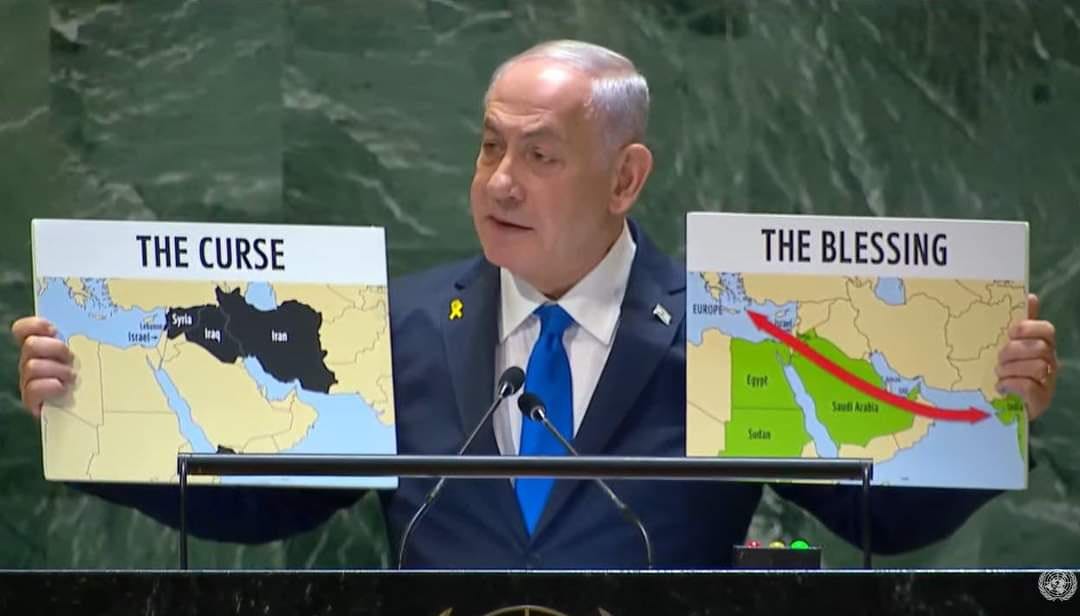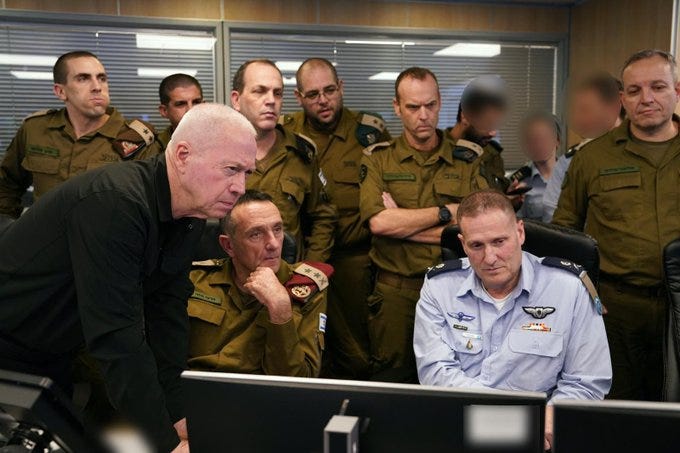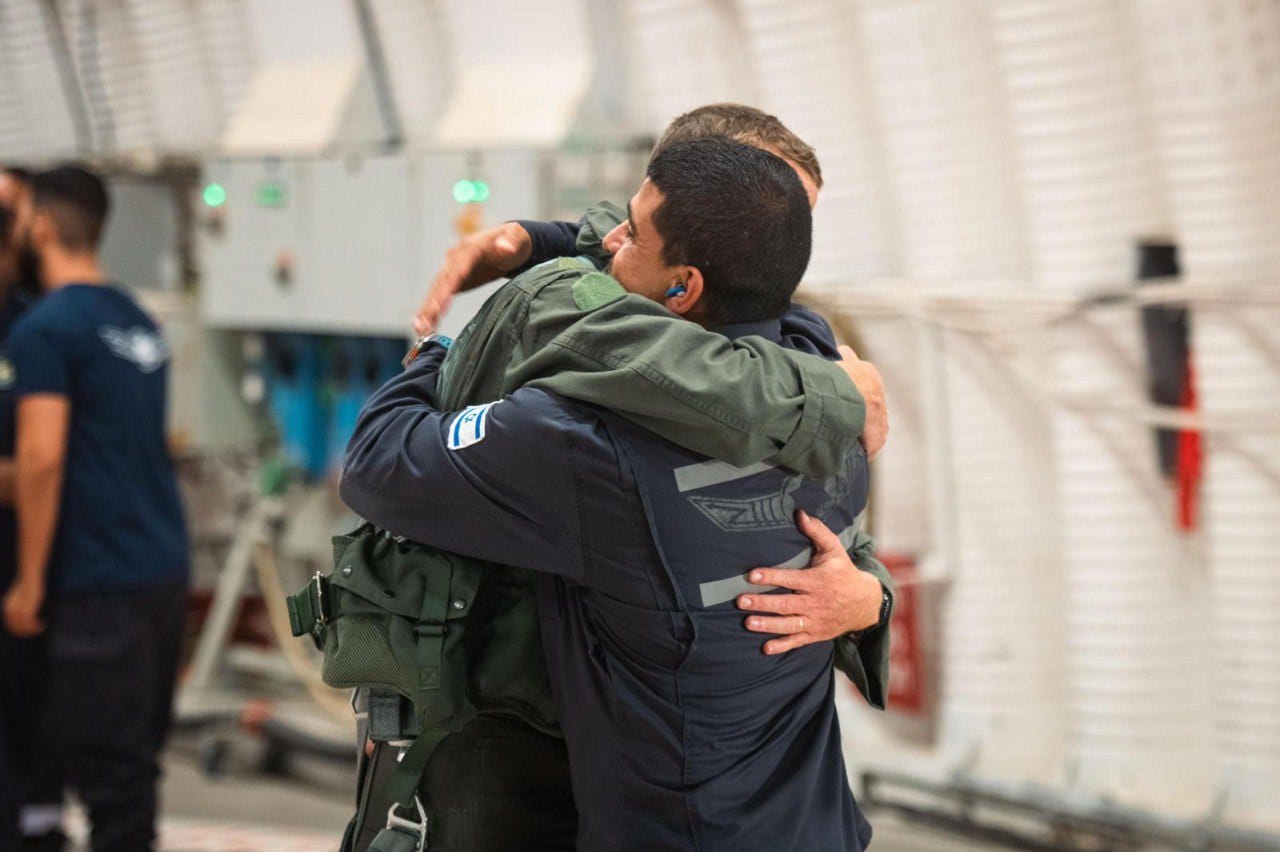Day 358 of the War: Nasrallah Killed, Israel Destroys Hezbollah Weapons, Houthis Fire Twice at Central Israel, Moodys Lowers Israel's Rating.
Tel Aviv Diary, September 28, 2024
It’s been an unparalleled day in Israel. A short time after I published Thursday night's update, the sirens suddenly went off as I was getting ready for bed. We quickly put a harness on the dog and rushed down to the shelter, which was already crowded with bleary-eyed children who had been fast asleep when the alarm sounded. Our upstairs neighbor arrived last, carrying his half-asleep two-year-old. For a moment, the situation looked grim; a glance at the map showed a large area under attack. We wondered if this was the feared large-scale Hezbollah strike on central Israel. We tried to make small talk as we waited. Then I received a notification on my phone: the alarm had been triggered by a ballistic missile launched from Yemen. I felt relief — Hezbollah had not begun their full-scale attack; rather, the Arrow Missile Defense System performed an interception at a high altitude. The widespread air-raid sirens were due to uncertainty over where the interception’s debris might fall. Aside from many people losing sleep, the only injuries caused was a minor traffic accident during the sirens and several people falling while running to their shelters.
On Friday morning, Hezbollah demonstrated that despite the pounding it had received from the IDF, it was still capable of launching rocket attacks. Ten rockets were fired at Haifa, most of which were intercepted, while two landed in open areas, damaging a car. A short time later, another barrage of ten rockets was fired toward Tiberias and the Sea of Galilee. Earlier in the morning, a single rocket had fallen into the middle of the Sea of Galilee.
The barrage was followed by four drones, which were intercepted over the sea near Rosh Hanikra. Up to this point, it was a relatively quiet day.
Then in the late afternoon, came Netanyahu’s speech to the UN. It was a defiant speech, but it was not up to Netanyahu's usual high rhetorical standards. No significant news was announced. Many expected he would declare the end of major fighting in Gaza, but instead, much of the speech repeated slogans about total victory, along with criticisms of the UN and the ICC. It felt like a missed opportunity. In retrospect, Netanyahu seemed distracted.
A little over an hour after Netanyahu finished speaking, reports began to surface indicating that something significant was happening. The first information out of Beirut cited a major attack on the Dahiya area. This attack was not as limited as the earlier assassinations that had taken place. Soon, word spread that the target of the attack was Hezbollah's Secretary General, Hassan Nasrallah. IDF Spokesperson Rear Adm. Daniel Hagari appeared on air shortly after 6 PM to announce that the IDF had attacked Hezbollah's central command center.
It has since become clear that on Wednesday night, before Prime Minister Netanyahu flew to the United States, the security cabinet was presented with a plan to strike Nasrallah. They gave Defense Minister Gallant and Prime Minister Netanyahu the authority to proceed with the operation. On Friday afternoon, Israel time, confirmation came that Nasrallah would be meeting with his senior command in the Hezbollah command center bunker. Fighter Squadron 69, stationed at the Hatzerim air base and composed of F-15i fighter jets, was on standby. This squadron, considered the strategic bombing unit of the Air Force, carried 85 tons of bombs. Within minutes, bunker-busting bombs were launched one after another, targeting the bunker and the foundations of the four buildings above it, ensuring that the structures collapsed onto the bunker.
For the rest of the evening, the question was: had we been successful in killing Nasrallah? There were conflicting reports in the first minutes after the announcement; some said he was safe, and others said he was minimally injured. As the evening wore on, the growing consensus was that, indeed, he had been killed. The IDF stated that there was no question Nasrallah had been at the site, and the Air Force maintained that if he had been there, he could not have survived. The next question on all of our minds was: how would Hezbollah respond? During the night, the army spokesman took to the air and shared intelligence showing three specific buildings in Beirut’s Dachiya neighborhood, explaining Hezbollah’s usage of the basements to store ground-to-sea missiles. Rear Adm. Hagari told the residents of these buildings to leave immediately. The residents left, and the buildings were destroyed as were the missiles below.
We went to sleep last night believing that we would be awakened by a retaliatory missile attack. Surprisingly, our sleep was not interrupted. In the morning, the army officially announced that Nasrallah had been killed in the attack.
This was the official announcement.
The IDF spokesperson announces that yesterday (Friday), the Israeli military successfully eliminated Hassan Nasrallah, the leader and one of the founders of the terrorist organization Hezbollah, along with Ali Karaki, Hezbollah's Southern Front commander, and other senior Hezbollah leaders.
The Israeli Air Force, with precise intelligence provided by the Intelligence Directorate and other security services, struck Hezbollah's main underground command center located beneath a residential building in the Dahiya area of Beirut. The attack occurred while the top Hezbollah leadership was in the command center, coordinating terror activities against Israeli civilians.
During his 32-year tenure as Hezbollah’s leader, Hassan Nasrallah was responsible for the deaths of many Israeli civilians and soldiers, orchestrating thousands of terrorist operations against Israel and worldwide. Nasrallah was the key decision-maker and sole approver of strategic and, at times, tactical decisions within the organization.
Since joining the war against Israel on October 8, Hezbollah, under Nasrallah's leadership, continued its attacks on Israeli citizens, further escalating the conflict in Lebanon and the entire region.
The IDF will continue to target anyone involved in terrorism against Israeli civilians.
Others were killed along with Nasrallah, including all those present at the meeting. While the complete list of names has yet to be released, one confirmed fatality is Gen. Abbas Nilforoushan, a senior commander of Iran's Quds Force.
Israel continued to target Hezbollah’s armaments as well as key personnel that night, including Muhammad Ali Ismail, the commander of Hezbollah’s missile unit in Southern Lebanon, and his deputy, Hussein Ahmad Ismail, who were both killed. Several other Hezbollah commanders and operatives were also eliminated in the operation.
Saturday saw several Hezbollah rocket attacks aimed at targets across the Galilee and the West Bank. While the attacks were broad, the number of rockets in each strike was relatively small. There was one attempt to strike the Tel Aviv area, but the rocket fell into the sea.
Throughout the afternoon and evening, Israeli forces continued to launch strikes on Beirut, with three aimed explicitly at what remains of Hezbollah's leadership.
In the early afternoon, an Iranian civilian airliner tried to fly to Beirut with what Israeli intelligence believed were arms for Hezbollah. The IDF broke into the radio communications of the Beirut airport tower and stated that if the plane landed, it would be bombed after landing. The plane returned to Iran. A short time after, the Lebanon Minister of Transportation announced that Lebanese airspace was closed to all planes from Iran.
Late this afternoon, we again returned to the bomb shelters as air-raid sirens went off over large areas of central Israel. The Houthis in Yemen had again fired a ballistic missile at central Israel. The Arrow System successfully intercepted it.
Subsequent to the operation eliminating Nasrallah, reports emerged that the U.S.
administration was upset, feeling misled by Israel, as Jerusalem had expressed interest in a ceasefire while simultaneously planning this attack. Despite any diplomatic tensions, the mission's success garnered widespread attention, with President Biden issuing the following statement:
Statement from President Joe Biden on the Death of Hassan Nasrallah
Hassan Nasrallah and the terrorist group he led, Hezbollah, were responsible for killing hundreds of Americans over a four-decade reign of terror. His death from an Israeli airstrike is a measure of justice for his many victims, including thousands of Americans, Israelis, and Lebanese civilians.
The strike that killed Nasrallah took place in the broader context of the conflict that began with Hamas’s massacre on October 7, 2023. Nasrallah, the next day, made the fateful decision to join hands with Hamas and open what he called a “northern front” against Israel.
The United States fully supports Israel’s right to defend itself against Hezbollah, Hamas, the Houthis, and any other Iranian-supported terrorist groups. Just yesterday, I directed my Secretary of Defense to further enhance the defense posture of U.S. military forces in the Middle East region to deter aggression and reduce the risk of a broader regional war.
Ultimately, our aim is to de-escalate the ongoing conflicts in both Gaza and Lebanon through diplomatic means. In Gaza, we have been pursuing a deal backed by the UN Security Council for a ceasefire and the release of hostages. In Lebanon, we have been negotiating a deal that would return people safely to their homes in Israel and southern Lebanon. It is time for these deals to close, for the threats to Israel to be removed, and for the broader Middle East region to gain greater stability.
Vice President Harris released the following statement:
September 28, 2024
Statement by Vice President Harris on the Death of Hassan Nasrallah
Hassan Nasrallah was a terrorist with American blood on his hands. Across decades, his leadership of Hezbollah destabilized the Middle East and led to the killing of countless innocent people in Lebanon, Israel, Syria, and around the world. Today, Hezbollah’s victims have a measure of justice.
I have an unwavering commitment to the security of Israel. I will always support Israel’s right to defend itself against Iran and Iran-backed terrorist groups such as Hezbollah, Hamas, and the Houthis.
President Biden and I do not want to see conflict in the Middle East escalate into a broader regional war. We have been working on a diplomatic solution along the Israel-Lebanon border so that people can safely return home on both sides of that border. Diplomacy remains the best path forward to protect civilians and achieve lasting stability in the region
So, where do we stand now? It’s hard to believe how successful the Israel Air Force (IAF), working with Israel’s intelligence services, has been in the last two weeks. I admit that I was wrong when I recently said Israel was not ready for a full-scale war in the North. At this point, we have come close to destroying Hezbollah. If you combine the middle-level commanders who were wounded by the beepers, with the high-level commanders we killed, they are left with almost no leadership. The air force has been highly successful in destroying Hezbollah’s missiles. The very small number of rocket attacks Hezbollah has launched since Israel started destroying their capabilities has surprised everyone. Since these attacks began 10 days ago, there have been no Israeli fatalities.
What’s the next step? If we continue to dismantle Hezbollah’s military capabilities, there is a serious chance of changing the political situation in Lebanon. Around Lebanon and in numerous parts of Syria, Nasrallah’s demise was celebrated. The Lebanese people and government can exploit the circumstances if the United States and France take the initiative and support the Lebanese Government in regaining control of their country. In addition, there can be no question that Iran is losing its most important asset in its confrontation with Israel. There is some concern that Iran might try to intervene, but I believe it’s too late. With the U.S. forces ready in defense and the IAF threatening to respond in Iran, I doubt they will do more than issue bellicose statements.
One word on the feeling on the streets of Israel today: For the first time, many Israelis had smiles on their faces. The year-long depression might not be over, but for the first time in a long time, something has changed. There is some hope.
HOSTAGES
Despite the successes in Lebanon, we cannot forget the 101 hostages in Gaza.
GAZA
The army released the following statement on Friday
Today, the IDF states that "Hamas' military wing in Gaza has lost its ability to function as a military organization and has become a guerrilla and terror group. There is still a way to go in dismantling its guerrilla capabilities. Hamas is not the same organization it was on 7/10 (October 7) – and we continue to operate in Gaza with force and deepen the achievements."
Regarding the war objectives, the IDF emphasizes again today th
at the return of the hostages from Gaza is the most urgent goal and should take priority over defeating Hamas' capabilities. "If we wait, it's uncertain if there will be anyone to bring back," the army says.
ECONOMY
Unfortunately, there was some bad news on Friday night. Moody's has downgraded Israel's credit rating from A2 to Baa1 due to the ongoing war with Hezbollah and the broader geopolitical situation.In addition, Moody’s pointed to the fact that the government had not reacted to the previous downgrade and addressed any of the issues highlighted in the accompanying report. The agency raised concerns over the rising costs of the war, which have exceeded NIS 250 billion ($67.6 billion), and the lack of an effective "exit strategy" for the conflict. The downgrade indicates that Moody’s sees increased political and security risks, impacting Israel’s economic stability and ability to recover swiftly.
Moody’s also highlighted that Israel’s fiscal health is under stress as the government now faces higher borrowing costs due to the lower credit rating. Unlike previous conflicts, the agency expressed doubts about a quick economic recovery, as prolonged military engagement could further strain Israel's public finances. These developments have raised concerns about the long-term financial impact on the country's debt ratio and economic growth prospects.
∞–––––∞–––––∞–––––∞–––––∞–––––∞–––––∞–––––∞–––––∞–––––∞
A PIECE OF HISTORY WILL RETURN TOMORROW.








Great “man on the street” report, Marc! This American appreciates your perspective and insights.
Glad to see Israel take the initiative. Peace through strength and deterrence. No negotiations with terrorists. The US broadcasts speak of escalation. Through these bold moves a path to de-escalation has opened up. Appeasement has never been a pathway to peace.